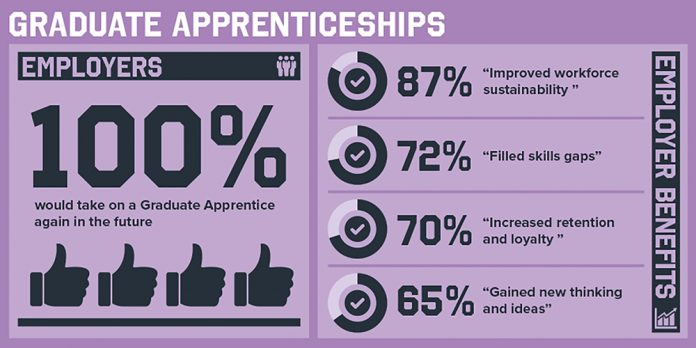Apprenticeships in Scotland, across all levels, will be vital to our collective hopes of an economic recovery. The Scottish Government itself understands the importance of apprenticeships in responding to the effects of the pandemic to support individuals and the economy and is actively encouraging and even incentivising business to take on apprentices. The recently announced Apprenticeship Employer Grant provides employers with up to £5,000 if they take on an apprentice, including Graduate Apprentices.
In addition, payments for employers recruiting Graduate Apprentices who have lost their jobs is being increased from £2,000 to £5,000 through the Adopt an Apprentice scheme.
Introduced in 2017, Graduate Apprenticeships (GA) are growing in importance in addressing critical skills gaps and creating a talent pool for Scottish business. GAs enable employers to upskill their workforce – either new or existing employees – to meet the growing demands of business, allowing them to gain new qualifications whilst remaining in paid employment.
What are Graduate Apprenticeships?
GAs are aimed at anyone over the age of 16 who lives and works in Scotland. All degrees are fully funded by Skills Development Scotland with support from the European Social Fund. Crucially, during these challenging times, this means there are no fees for either apprentices or employers.
Graduate Apprentices spend approximately 80% of their time in work and 20% in university. And depending on their previous skills, qualifications and experience, they may qualify for flexible entry points on to the programme. The immersive nature of the apprenticeships means that candidates are adding value to their companies from day one by bringing academic knowledge back into the workplace.
Addressing Scotland’s skills needs
GAs are developed in partnership with industry. They have been specifically designed to address critical skills needs, particularly to support key sectors of the Scottish economy.
There’s a broad range of GA providers across the country, with a total of 13 different programmes available. At Heriot-Watt University we currently offer nine programmes:
- MA (Hons) IT Management for Business
- BSc (Hons) Software Development for Business
- BSc (Hons) Data Science
- BEng (Hons) Engineering: Design and Manufacture
- BEng (Hons) Engineering: Instrumentation Measurement and Control
- BEng (Hons) Civil Engineering
- BEng (Hons) Construction and the Built Environment
- MA (Hons) Business Management
- MA (Hons) Business Management: Financial Services
The benefits to your business
GAs are proven to bring tangible benefits to an organisation. Sandy Murray, Director of Apprenticeships at Heriot-Watt, explains “Research has shown that Graduate Apprenticeships can boost the performance of a business in a number of ways. For example, this could include increased productivity and improved service delivery all the way through to better talent development and retention and staff engagement. And we shouldn’t forget that Graduate Apprenticeships are also a great way to attract new, young talent into the workforce.”
Specifically:
- They’re a great way to attract new talent to a company or to upskill existing employees
- Improved cost-efficiencies in training and recruitment – all GAs are fully funded by SDS
- The programmes are designed to develop skills tailored to the needs of your business
- The work-based learning approach ensures practical application in the business environment
- They’re an excellent way to recover the Apprenticeship Levy the company may already be paying
The diagram above is taken from the SDS 2020 Employer survey and it demonstrates how employers see the benefits from GAs.
GAs in action
There’s no better way to understand the benefits of GAs than hearing from students themselves. You can read our success stories here.
A proud history and looking to the future
Heriot-Watt is one of the largest providers of this pioneering programme. The university has a proud history of working closely with industry. Sandy Murray concludes: “People are often surprised to hear that Heriot-Watt has been offering work-based learning since 1821 and we think that demonstrates the ethos of the university and our continuing commitment to our students and employers at a time when we’re trying to help in the recovery of the economy.
“Graduate Apprenticeships also provide a means to strengthen relationships between industry and educational institutions and help to identify skills requirements of the future. Heriot-Watt is looking forward to being at the forefront of that.”
If you’d like to find out more, you can email the Heriot-Watt GA team at ga@hw.ac.uk or visit www.hw.ac.uk/ga






